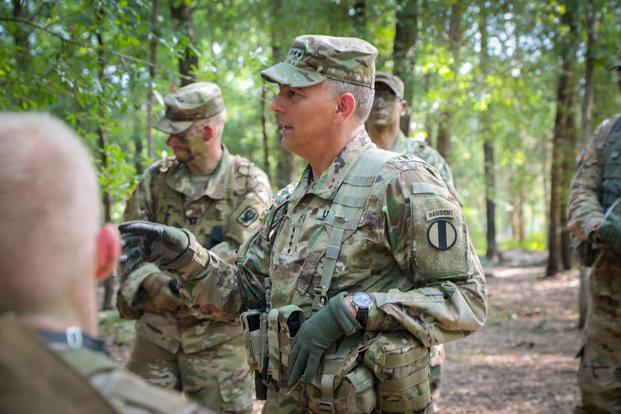The head of Army Training and Doctrine Command said Jan. 7 that the U.S. military's advise-and-assist missions in places such as Iraq and Afghanistan have eroded young leaders' confidence and willingness to make necessary decisions.
Gen. Stephen Townsend, TRADOC commander, said he is "troubled" that many young leaders -- from sergeants to lieutenant colonels -- don't believe in Army Mission Command, the service's doctrine designed to empower ground combat leaders to make decisions that may not follow initial orders from senior commanders.
"There is a lot of agreement that Mission Command is the right leadership and command doctrine for our Army; however, there is an alarming number of folks in uniform who don't believe that we, as an Army, are constantly practicing the principles of Mission Command," he told an audience Monday at an Association of the United States Army event.
Townsend said this has become obvious to him after visiting pre-command courses across the service, especially when he shows a slide with the six tenets of Mission Command, which include:
- Building cohesive teams through mutual trust.
- Creating shared understanding.
- Providing clear commander's intent.
- Exercising disciplined initiative.
- Using mission orders.
- Accepting prudent risk.
Mission Command is designed to allow leaders and units to adjust a plan as conditions on the battlefield change, as long as the adjustments can still accomplish the mission, Townsend said.
"First, I want you to be smart enough to realize that the plan I gave you is not going to work; then, I want you to be smart enough to come up with a plan that will work," he said. "Then, I want you to have the guts enough to do that plan, even if you can't talk to me."
In the likelihood that U.S. forces may face near-peer adversaries such as Russia and China on the battlefield, units must be prepared for their command-and-control (C2) systems to be compromised, Townsend said.
"They are going to jam us. They are going to spoof our C2 systems. You might think your C2 system is working, but the icons aren't showing you their true grids," he said.
"They are showing you what the enemy wants you to see, so how do you work that problem? You do it with Mission Command," he continued. "[Then] I ask them who buys into that? It's been shocking to see how few hands go up."
Townsend said he is convinced that the U.S. military's shift from direct combat to train, advise and assist operations in Iraq, Afghanistan and Syria in the past several years has sent the wrong message to young leaders.
"When I went to war in Afghanistan in 2002, I didn't feel like I was over-directed or micro-managed in any way," he said. "When I fought in the surge in Iraq in 2006, I also didn't feel like anyone was breathing down my neck. I was given a job to do, I was given an area to do it in and I had a lot of latitude to do that job."
Townsend said he thinks the process of "trying to extricate ourselves from direct leadership in these long wars in Afghanistan and Iraq and Syria, where we want our partners to do more," has created distrust of Army Mission Command.
"So we started telling all our units, you may not do these operations, you may not lead these operations; our partners must take lead," he said.
"So therefore, if you want to do something, you have to submit to me ... a five-paragraph field order or an eight- or nine-slide document that we are going to brief up to a colonel, or maybe a brigadier general, who is going to approve you -- U.S. forces -- to do this job, instead of our counterparts," he said. "That has become fairly standardized in both the Iraq theater and the Afghanistan theater over the last 10 years or so. And I think a lot of these junior leaders -- that is what their experience is."
Townsend said he has made it one of his priorities to "re-instill" the confidence that young leaders need to succeed on the battlefield.
"The bottom line is that I believe that Mission Command is the only way to lead a winning Army. We are going to fix this," he said.
-- Matthew Cox can be reached at matthew.cox@military.com.










